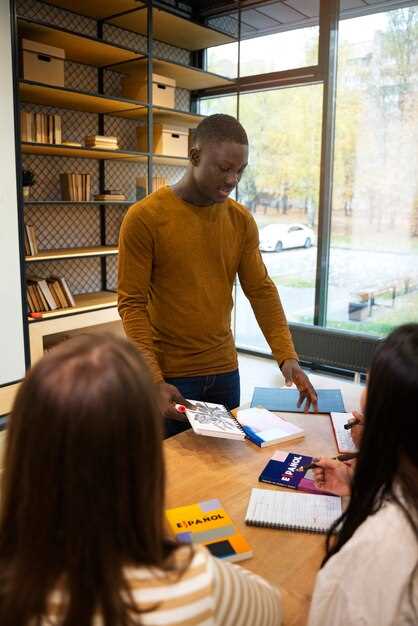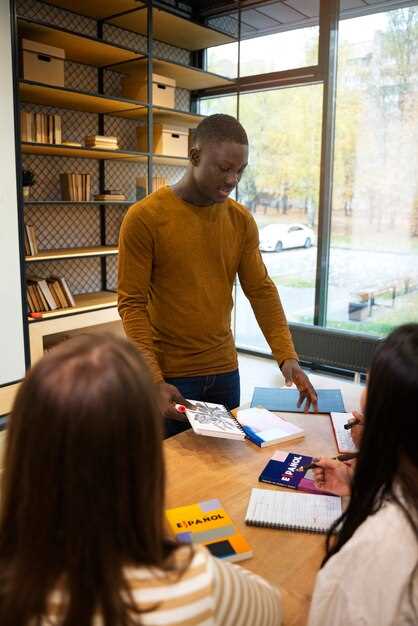Accessing tailored academic resources can significantly enhance the educational experience for Indigenous students. Universities and colleges now offer a range of programs specifically designed to address barriers faced by these students. Start by exploring dedicated Indigenous student centers on campuses. These centers commonly provide mentorship, tutoring, and various workshops that focus on both academic skills and cultural enrichment.
Many institutions partner with Indigenous organizations to create comprehensive support systems. Utilizing these partnerships expands opportunities for scholarships and funding targeted at Indigenous students. Seek out programs that connect students with academic advisors who understand the unique cultural contexts and challenges they may encounter.
Engaging in community-based learning can also enrich a student’s academic journey. Look for programs that offer internships and fieldwork opportunities within Indigenous communities. Such experiences allow for practical application of academic knowledge while reinforcing connections to cultural heritage. These resources exemplify how institutions can support Indigenous students in achieving academic success while honoring their identities.
Identification of Academic Needs for Indigenous Students

Assess academic needs through direct engagement with Indigenous students. Conduct surveys and focus groups to gather input on their unique challenges. Academic performance data can provide insights, but personal experiences reveal deeper issues.
Recognize the importance of cultural relevance in curriculum design. Incorporate Indigenous perspectives and materials that resonate with students’ identities. This approach enhances engagement and retention in academic programs.
Address potential barriers such as access to technology and study resources. Offer workshops on digital literacy and equip students with necessary tools to succeed in their studies. Partnering with local organizations can enhance resource availability.
Implement mentorship programs that connect Indigenous students with peers or professionals from similar backgrounds. These relationships can offer encouragement, guidance, and practical advice tailored to their needs.
Include mental health support as a key component of academic assistance. Create safe spaces where students can discuss their experiences and seek help. Accessible counseling services can significantly alleviate stress and improve focus on studies.
Lastly, involve Indigenous communities in decision-making processes regarding academic support initiatives. Their insights will ensure that resources and programs are tailored effectively to meet students’ needs and aspirations.
Accessing Scholarships and Financial Aid Specifically for Indigenous Students

Research specific scholarships and financial programs designed for Indigenous students. Many organizations, educational institutions, and government bodies offer targeted funding opportunities. Start with the American Indian College Fund, which provides scholarships to enrolled tribal members. Each tribe may also have its own scholarship programs, so connect with local tribal offices for details.
Apply for federal and state financial aid by filling out the Free Application for Federal Student Aid (FAFSA). Many Indigenous students qualify for grants and financial aid programs that help cover tuition costs. Some states offer additional grants for Native students, so check local resources as well.
Private Scholarships and Organizations
Explore private organizations focused on supporting Indigenous education, such as the Native American Scholarship Fund. Websites like Fastweb and Cappex can help identify specific scholarships that match your profile. Many companies also provide scholarships as part of their diversity and inclusion initiatives–research these opportunities but make sure you align your application to their criteria.
Resources for Support and Guidance
Seek help from campus offices dedicated to Indigenous student support services. They often have dedicated staff who are knowledgeable about scholarships and can assist in the application process. Alumni networks can also provide mentorship and information on additional funding sources. Online forums and social media groups often share scholarship opportunities as well, keeping you informed about new options.
Networking Opportunities through Indigenous Student Organizations

Join Indigenous student organizations to build valuable connections with peers and professionals. These groups offer workshops, social events, and mentorship programs tailored to your unique experiences. Engage actively and contribute to discussions; this involvement amplifies your visibility and expands your network.
Types of Indigenous Student Organizations
| Organization Type | Description |
|---|---|
| Cultural Clubs | Focus on preserving and promoting Indigenous heritage through events, festivals, and outreach. |
| Academic Groups | Provide support for academic success, including study sessions, guest lectures, and resource sharing. |
| Professional Associations | Facilitate networking with industry professionals, offering internships and career advice. |
How to Get Involved
Attend initial meetings to learn about each organization’s goals, and express your interest in their activities. Volunteer for events to gain experience and meet like-minded individuals. Leverage social media platforms to follow these organizations and stay updated on their initiatives and networking opportunities. Collaborate with members on projects that resonate with you, enhancing your professional and social circles.
Participating in these organizations enhances interpersonal skills and fosters relationships that can benefit your career. Take advantage of these incredible resources to connect with the Indigenous community while pursuing your academic aspirations.
Culturally Relevant Academic Counseling Services

Provide personalized academic counseling that respects and integrates Indigenous cultural values. Counselors trained in cultural competency can create an atmosphere where Indigenous students feel understood and supported. These professionals prioritize relationship-building, offering guidance that aligns with spiritual and community traditions.
Implement culturally informed assessments tailored to the unique experiences of Indigenous students. Recognize that traditional educational frameworks may not align with Indigenous ways of knowing. Utilize tools that reflect diverse learning styles and emphasize storytelling, oral traditions, and community-based knowledge.
Establish mentorship programs connecting Indigenous students with professionals who share similar backgrounds. Mentors can offer relatable insights and guidance, providing a sense of belonging and encouraging students to persist in their academic endeavors. This connection nurtures both individual growth and communal support.
Encourage participation in workshops that focus on culturally relevant academic skills, such as research methods that incorporate Indigenous perspectives. Facilitate discussions on how historical context shapes current academic challenges, enabling students to connect their identities to their studies and fostering resilience.
Offer resources like counseling services that address mental health in a culturally appropriate way. Engage traditional healers or facilitate access to culturally relevant mental health resources, ensuring that students have support for both academic and personal challenges.
Collaborate with local Indigenous communities to enhance the offerings of academic counseling services. Invite community elders or cultural leaders for workshops and events, bridging academic success with cultural identity. This partnership strengthens ties between the educational institution and Indigenous populations, enriching the experience for all involved.
Mentorship Programs Connecting Indigenous Students with Professionals
Connect with established professionals through targeted mentorship programs designed for Indigenous students. These initiatives provide opportunities for one-on-one guidance, shaping academic and career paths. Students receive personalized advice on navigating higher education, applying for jobs, and developing professional networks.
Programs to Explore
Explore notable mentorship programs like the Indigenous Mentorship Network Program, which pairs students with mentors from similar cultural backgrounds across various professions. Participants engage in discussions that cover academic challenges, career advancement, and industry insights, ensuring mentees receive relevant and practical support.
The Future Leaders Program offers workshops and mentorship tailored for students interested in leadership roles. This program focuses on skill-building, leadership training, and community engagement to prepare students for future challenges while reinforcing their cultural identity.
Benefits of Participation
Engagement in mentorship programs enhances confidence and academic performance. Through mentoring relationships, students gain access to resources such as internships, research opportunities, and community education initiatives. These connections lead to enhanced employability and valuable lifelong networks.
Make the most of mentorship connections by actively participating in program activities. Attend networking events, follow up with mentors regularly, and seek advice on specific challenges. Establishing a clear communication channel fosters a more meaningful relationship that benefits both parties.
Leveraging professional mentorship not only enriches academic experiences but also contributes to the holistic development of Indigenous students. With tailored support and encouragement, students can thrive in their chosen paths.
Utilizing Online Learning Resources Tailored for Indigenous Cultures
Leverage platforms like Coursera and edX that offer courses on Indigenous history, culture, and languages. These courses provide insight and knowledge directly relevant to Indigenous communities, connecting students with instructors who bring authentic perspectives.
Explore Indigenous-driven resources, such as the National Indigenous Knowledge and Learning Framework, which presents educational materials focusing on traditional ecological knowledge and cultural practices. This framework supports learning styles deeply rooted in Indigenous ways of knowing.
Engage with social media and online communities dedicated to Indigenous students. Platforms like Facebook and Reddit host groups that share resources, stories, and support networks, creating spaces for mentorship and collaboration among peers.
Utilize free online libraries such as Project Gutenberg for accessing texts by Indigenous authors. Reading literature that reflects Indigenous voices fosters understanding and connection to cultural narratives.
Participate in online webinars and workshops by organizations like First Nations Development Institute. These events often address pertinent topics such as Indigenous rights and sovereignty, providing tools and knowledge for advocacy and empowerment.
Check out podcasts like “Indigenous Routes”, which discuss Indigenous perspectives on various topical issues. These audio resources offer another layer of engagement with cultural narratives and contemporary challenges faced by Indigenous communities.
Use local university portals to find additional online resources tailored to Indigenous students. Many institutions curate specialized materials, offering tutorials and online support that reflect the unique educational needs of Indigenous learners.
Prioritize accessing multilingual learning resources that celebrate Indigenous languages and promote their revival, such as app-based language courses. These apps create interactive environments for language acquisition and appreciation.
Workshops Focused on Study Skills for Indigenous Learners
Participate in workshops that directly address the study habits and learning styles of Indigenous students. These sessions incorporate culturally relevant practices and methodologies to enhance comprehension and retention.
Engage with experienced facilitators who tailor content to meet the unique needs of participants. Focus on practical strategies, such as time management techniques, note-taking methods, and test preparation skills. These skills build a solid academic foundation, enabling learners to excel in their studies.
Incorporate collaborative learning activities. Working alongside peers fosters a sense of community and shared learning experiences. Group discussions and projects allow for the exchange of ideas, enhancing understanding through diverse perspectives.
Utilize technology effectively. Workshops can include lessons on utilizing digital tools and resources, such as online databases and citation software. This knowledge ensures students can access and manage information efficiently, which supports their research and assignments.
Encourage self-reflection during these workshops. Students can assess their own learning styles and identify personal strengths and weaknesses. This process involves setting realistic academic goals and developing personalized plans for achieving them.
Incorporate traditional knowledge and storytelling into sessions. Integrating these elements enriches the learning experience and validates the cultural backgrounds of Indigenous students. It also reinforces the importance of community values in their academic pursuits.
Provide ongoing support after workshops. Establish mentorship programs that connect students with academic advisors or peers for continuous guidance. Creating a supportive network encourages persistence and resilience in academic challenges.
Peer Support Networks for Indigenous Student Communities
Create peer support networks that connect Indigenous students with one another. These networks encourage shared experiences and provide a safe space for discussing challenges and achievements. Identify existing student groups or organizations on campus that specifically cater to Indigenous students and become actively involved.
Organize regular meetings, workshops, and social events within these networks. Facilitate discussions around academic pressures, cultural identity, and mental health. Invite guest speakers, including successful Indigenous alumni, to share insights and strategies for overcoming barriers.
Develop mentorship programs where upper-year students provide guidance to newcomers. This not only helps students adjust to the academic environment but also strengthens community bonds. Encourage participants to share resources, such as study materials, tutoring services, and course recommendations.
Utilize online platforms and social media to enhance connectivity. Create dedicated groups where members can ask questions, share advice, and promote events. Regularly update these platforms with resources related to scholarships, academic deadlines, and Indigenous cultural events.
Designate an advisor or faculty member who understands Indigenous issues to support these networks. Their involvement can provide additional resources and advocacy for students when needed. Collaborate with campus services to ensure they understand the unique needs of Indigenous students within these support systems.
Encourage students to celebrate Indigenous culture through community events, cultural workshops, and storytelling sessions. These activities can strengthen identity and pride, creating a more inclusive environment. Gathering in cultural spaces within or near campuses can foster a sense of belonging.
Continuously evaluate the effectiveness of these networks through feedback from participants. Improvements can be made based on their input to better meet the needs of the community. A thriving peer support network will empower Indigenous students to succeed academically and personally.
Bridging Programs to Assist Transition into Higher Education
Bridging programs offer Indigenous students structured pathways into higher education, addressing unique challenges and enhancing academic readiness. These initiatives focus on academic skills, cultural support, and community building, ensuring a smoother transition.
Key Components of Bridging Programs
Academic tutoring is a core element, equipping students with essential skills in writing, research, and critical thinking. Workshops on time management and study strategies help students establish effective habits. Participants also benefit from mentorship opportunities, connecting them with peers and educators who understand their experiences and aspirations.
Cultural integration is another crucial aspect. Programs often include cultural orientation sessions that celebrate Indigenous heritage, fostering a sense of belonging. Collaborating with Indigenous elders and knowledge keepers enriches the learning experience, ensuring that students feel supported both academically and culturally.
Access to Resources
Financial support is available through scholarships and grants specifically intended for Indigenous students. Bridging programs frequently inform students about these funding opportunities, making higher education more accessible. Networking events connect students with community resources and organizations that offer additional support services.
Connecting students to health and wellness resources ensures a holistic approach to education. Mental health services and counseling help in addressing challenges that may arise during the transition. By prioritizing both academic and personal growth, bridging programs create a comprehensive support system that empowers Indigenous students to thrive in higher education.
Collaboration with Local Indigenous Communities for Educational Resources
Engage actively with local Indigenous communities to access rich educational resources. Establish partnerships with Indigenous leaders and organizations to tailor curriculum content to reflect Indigenous knowledge and perspectives. This collaboration enhances student learning experiences significantly.
- Organize regular workshops with Indigenous elders to share traditional knowledge and practices.
- Incorporate local Indigenous languages into educational materials and programs.
- Develop mentorship programs pairing Indigenous students with community role models.
Seek input from Indigenous communities to identify historical sites that can serve as outdoor classrooms, providing hands-on learning experiences. Facilitate visits and excursions to these sites to deepen students’ connections to the land and culture.
Utilize technology to bridge gaps in resources. Partner with local Indigenous community centers to create digital archives or virtual classrooms that showcase Indigenous art, stories, and history.
- Collaborate on project-based learning initiatives focused on community issues.
- Incorporate Indigenous ways of knowing into research methods for student projects.
- Provide scholarships or financial support for Indigenous students pursuing higher education.
Regularly evaluate the effectiveness of these collaborations by gathering feedback from students and community members, making adjustments to ensure the partnership remains beneficial and relevant.
Accessing Mental Health Services within Academic Institutions
Reach out to your institution’s counseling center as a first step. Most universities provide a range of mental health services, including individual therapy, group sessions, and workshops focused on stress management and resilience. These services often cater to the unique needs of Indigenous students.
Explore cultural competency in your institution’s mental health programs. Look for counselors who demonstrate an understanding of Indigenous perspectives and challenges. This ensures that your mental health care aligns with your cultural context and personal experiences.
- Request referrals to culturally appropriate therapists.
- Inquire about peer support groups that focus on Indigenous issues.
- Check for collaborations with local Indigenous health organizations.
Utilize online resources, which many academic institutions offer. Websites often feature self-help tools, virtual counseling, and access to educational materials on mental health topics relevant to Indigenous communities. These can complement in-person services.
Engage in workshops or events hosted by your institution that highlight Indigenous mental health issues. Such programs promote awareness and provide strategies to cope with academic and personal stressors. Participation can enrich your understanding and connect you with peers facing similar challenges.
Don’t hesitate to speak with academic advisors about your mental health needs. They can guide you to relevant resources and accommodations that support your academic journey while considering your well-being.
Regularly check for updates on available services, as institutions may introduce new programs and partnerships aimed at enhancing mental health support. Staying informed allows you to take full advantage of available resources.
Advocate for yourself and your community by providing feedback on mental health services. Your insights can influence the development of programs that better meet the needs of Indigenous students and enhance overall support.
Video:
Navigating Career Resources for Native and Indigenous Students
Navigating Career Resources for Native and Indigenous Students by UConn Center for Career Development 65 views 1 year ago 19 minutes
Q&A:
What types of academic support programs are available for Indigenous students?
There are several types of academic support programs specifically designed for Indigenous students. These can include tutoring services, mentoring programs, study groups, and access to specialized academic advising. Many universities also offer cultural support services that help students connect with their heritage while pursuing their education. Additionally, scholarships and funding opportunities are often tailored for Indigenous students to help alleviate financial burdens.
How do academic resources for Indigenous students address cultural differences?
Academic resources for Indigenous students often take cultural differences into account by integrating Indigenous knowledge and perspectives into their curricula and support programs. This may involve having staff who are knowledgeable about Indigenous cultures and issues, offering programs that respect and honor Indigenous traditions, or providing spaces where Indigenous students can connect with their culture. Such approaches aim to create an inclusive environment that supports both academic success and cultural identity.
Are there any specific challenges Indigenous students face in accessing academic support?
Yes, Indigenous students may face various challenges when accessing academic support. These can include geographical barriers, a lack of culturally relevant resources, financial constraints, and a historically adversarial relationship with educational institutions. Some students may also encounter feelings of isolation or a lack of representation, which can deter them from seeking help. Awareness of these factors is crucial in developing more effective support systems tailored to meet their needs.
What role do Indigenous student organizations play in providing academic support?
Indigenous student organizations play a significant role in providing academic support by creating a sense of community among Indigenous students. These organizations often host study sessions, workshops, and social events that promote academic success while celebrating Indigenous culture. They can also serve as a bridge between students and the wider educational institution, advocating for more resources and support tailored to Indigenous students’ needs and experiences.
How can non-Indigenous educators better support Indigenous students in their academic journeys?
Non-Indigenous educators can better support Indigenous students by incorporating Indigenous perspectives and content into their lessons, fostering an inclusive classroom environment, and being open to learning about and respecting Indigenous cultures. Building relationships with Indigenous students and understanding their unique experiences can also be beneficial. Additionally, educators can advocate for resources and institutional changes that promote equity and access for Indigenous students within their academic institutions.
What types of academic support programs are available for Indigenous students?
There are various academic support programs designed specifically for Indigenous students. These often include tutoring services, mentoring programs, language preservation initiatives, and scholarships tailored to Indigenous communities. Universities and colleges may also offer workshops on academic skills, cultural competency training, and peer support groups that create a sense of belonging and community. Additionally, some institutions have dedicated advisors who understand the unique challenges Indigenous students may face, helping them navigate their academic paths.
How can Indigenous students access these resources effectively?
Accessing resources designed for Indigenous students typically involves visiting the campus or institution’s website for detailed information about available programs. Many colleges have Indigenous student centres with staff dedicated to providing support and guidance. It’s beneficial for students to reach out directly to these centres, as staff can provide personalized assistance and connect them with relevant programs, scholarships, and networking opportunities. Establishing relationships with faculty and participating in Indigenous student organizations can also enhance access to resources and community support.
